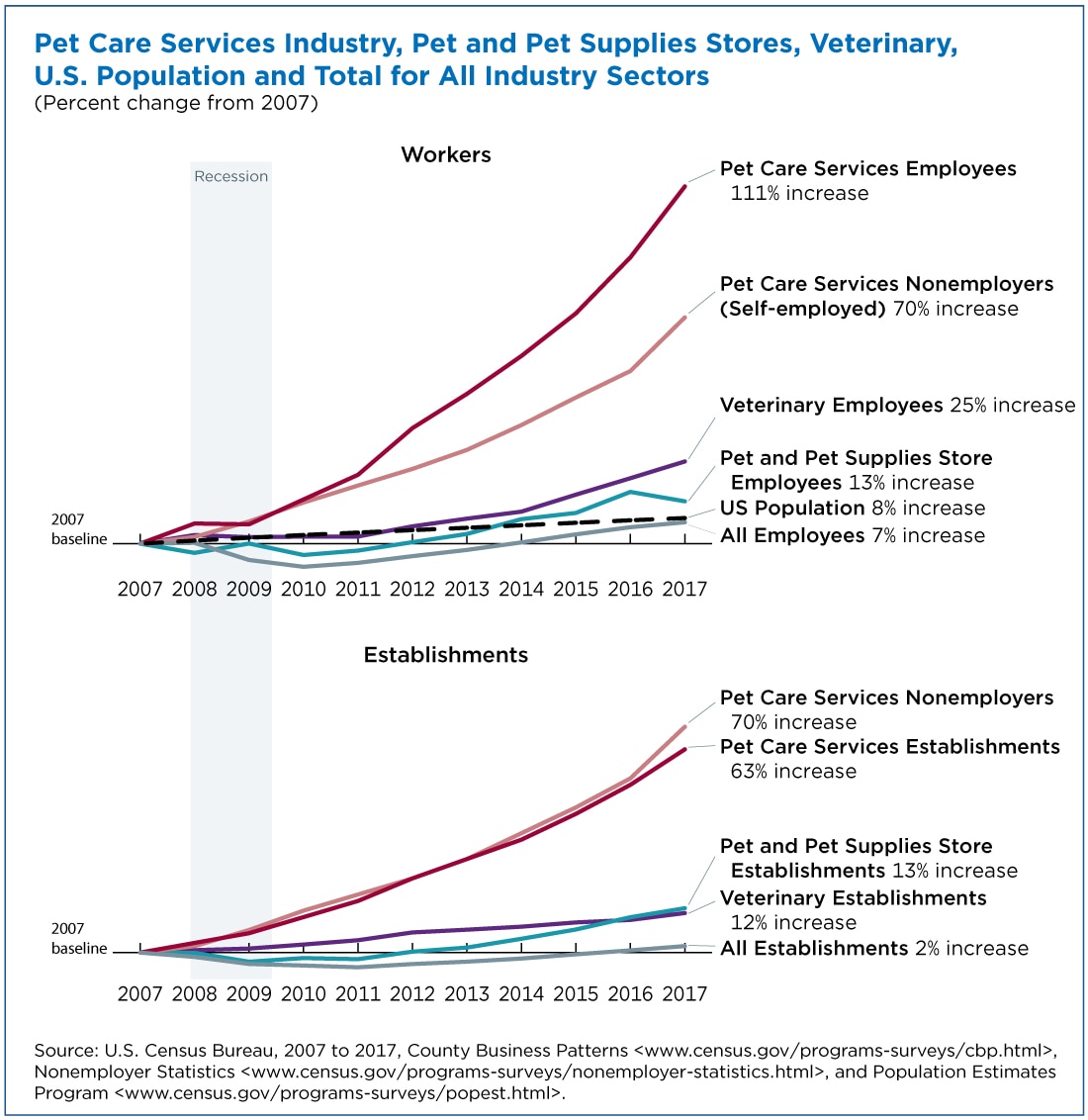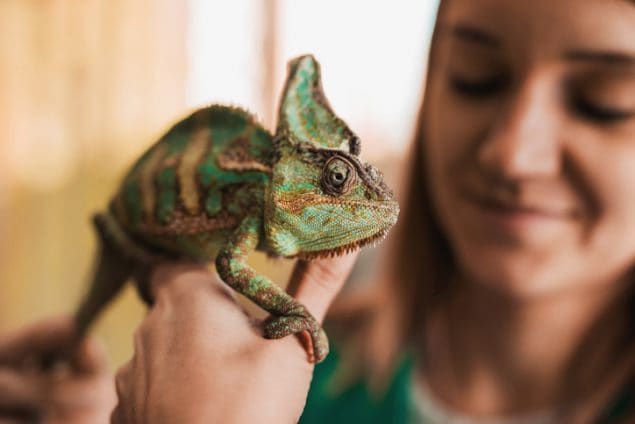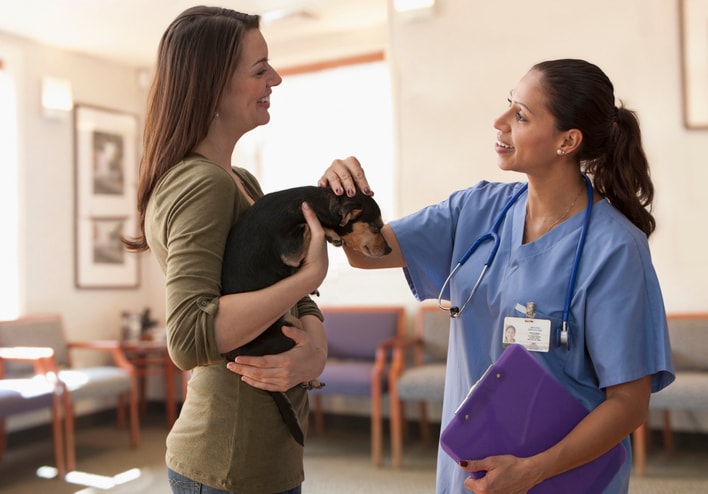National Pet Day was established in 2006 by Colleen Paige, an animal welfare advocate. Half (about 60 million) of American households own pets and the amount of money spent on our pets year year is evidence of the growing need for pet care and health care services.

Over the decade ending in 2017, sales of pet care services doubled, to a total of $5.8 billion, according to the latest Economic Census statistics.
The pet care services industry (NAICS code 812910) includes services such as grooming, boarding, training and pet sitting. It does not include veterinary services, boarding horses, transporting pets, pet food or other pet supplies.
With over 100,000 pet care service businesses, this industry increased its number of establishments by more than 60% since 2007, for both employer businesses and self-employed (nonemployer) businesses.
The number of people employed in pet care services rose sharply from 2007 to 2017. Excluding the self-employed, the number of workers grew from 52,855 paid employees to 111,384, a 111% increase, according to County Business Patterns data.
This substantially outpaces other pet-affiliated businesses, including pet and pet supply stores and veterinary establishments, and far exceeds not only the totals for all industry sectors (7%) but also the U.S. population growth (8%) during the same period.
Health benefits of owning a pet
Remember this pet day of the many health benefits of owning a pet. They can increase opportunities to exercise, get outside, and socialize. Regular walking or playing with pets can decrease blood pressure, cholesterol levels, and triglyceride levels. Pets can help manage loneliness and depression by giving us companionship. Most households in the United States have at least one pet.
Studies have shown that the bond between people and their pets can increase fitness, lower stress, and bring happiness to their owners. Some of the health benefits of having a pet include:
- Decreased blood pressure
- Decreased cholesterol levels
- Decreased triglyceride levels
- Decreased feelings of loneliness
- Increased opportunities for exercise and outdoor activities
- Increased opportunities for socialization
Pick the Right Pet

Learn more about different types of pets and other animals.
Before adopting a new pet, make sure that it is the right one for you and your family. Do some research beforehand about the specific needs of the animal. Ask yourself these questions before getting a pet:
- How long will this animal live?
- What does the pet eat?
- How much exercise does the pet need?
- How large will it become?
- How much will it cost for veterinary care?
- Do I have enough time to properly care for and clean up after the pet?
- What type of habitat does this pet need to be healthy?
- What type of exercise does this pet need?
- Are pets allowed in my house, apartment, or condominium?
- Are there young children, older people, or people with weak immune systems who will care for or be around the pet?
Children 5 years of age and younger, people with weakened immune systems, and people 65 years of age and older are more likely to get diseases spread between animals and people (also known as zoonotic diseases). Pregnant women are also at a higher risk for certain animal-related diseases. Before getting a new pet, keep the following in mind:
- Households with children 5 years of age and younger should not have pet reptiles (turtles, lizards, snakes), amphibians (frogs, toads), or backyard poultry because of the risk of serious illness from harmful germs spread between these animals and young children.
- People with weakened immune systems should take extra precautions when choosing and handling pets. Talk to your veterinarian for help picking the best pet.
- Pregnant women should avoid adopting a new cat or handling stray cats, especially kittens. Cats can carry a parasite that causes toxoplasmosis—a disease that can cause birth defects. If you are pregnant, you do not need to give up your current cat, but you should avoid changing cat litter.
- Pregnant women should avoid contact with pet rodents to prevent exposure to lymphocytic choriomeningitis virus, which can cause birth defects. If you’re pregnant and have a pet rodent, avoid direct contact and have someone else clean its habitat.
Stay Healthy Around Pets
Wash Your Hands

Whether you are playing with, feeding, or cleaning up after your pet this pet day, it is important to wash your hands to help reduce the risk of getting sick from germs pets can carry. If you or a family member are concerned about illness, talk to a doctor and mention the animals you’ve had contact with recently.
Always wash hands:
- After touching or playing with your pet
- After feeding your pet or handling pet food
- After handling pet habitats or equipment (cages, tanks, toys, food and water dishes, etc.)
- After cleaning up after pets
- After leaving areas where animals live (coops, barns, stalls, etc.), even if you did not touch an animal
- Before eating and drinking
- Before preparing food or drinks
- After removing soiled clothes or shoes
Running water and soap are best for hand washing, but you can use hand sanitizer until running water and soap are available. Adults should always assist young children with hand washing.
Keep Your Pet Healthy

Whether you have a dog, cat, horse, parakeet, gerbil, bearded dragon, or other fun pet, providing regular, life-long veterinary care is important for keeping your pet and family healthy. Regular veterinary visits are essential to good pet health. Talk to your pet’s veterinarian about how to keep your pet healthy. Provide your pet with a good diet, fresh water, clean bedding, and plenty of exercise. Keep up with your pet’s vaccines, deworming, and flea and tick control. Some pets can carry ticks that can spread serious diseases like Lyme disease and Rocky Mountain spotted fever to people. In areas with plague—including some rural areas in the western US—fleas can be a risk to both animals and their owners.
By keeping your pet healthy, you help to keep yourself and your family healthy. Contact your veterinarian if you have any questions about your pet’s health or if you think your pet may be sick.
Practice Good Pet Hygiene
In addition to hand washing, use this pet day to research practicing good pet hygiene that can help prevent the spread of germs between pets and people. Keep pets and their supplies out of the kitchen, and disinfect pet habitats and supplies outside the house when possible. Never clean supplies in the kitchen sink, food preparation areas, or the bathroom sink. Pets can contaminate surfaces in your home with germs—you don’t have touch pets to get sick from their germs.
Always remove your dog’s feces (poop) from your yard and public places by using a bag, and dispose of it in proper areas. Dog and cat poop can contain parasites and germs that can be harmful to people. Keep children away from areas that might contain dog or cat poop to prevent them from getting roundworms and hookworms. Cover sand boxes so cats don’t use them as a litter box. Clean the cat’s litter box daily to lower the chances of exposure to harmful parasites. Remember, pregnant women should avoid changing a cat’s litter box if possible.
Teach Children How to Interact with Animals
Pets can teach children compassion and responsibility. However, children 5 years of age and younger should be supervised while interacting with animals to ensure the safety of the child and the pet. This pet day, teach children to wash their hands right after playing with animals or anything in the animals’ environment (cages, beds, food or water dishes). Don’t let children kiss pets or put their hands or other objects in their mouths after handling animals.
Adults should supervise and be extra cautious when children 5 years of age and younger have direct contact with farm animals, including animals at petting zoos and fairs.
Keep Wildlife Wild

Although they may look cute and cuddly, avoid touching wild animals to reduce the risk of illness and injury. Don’t encourage wild animals such as raccoons, prairie dogs, or wild rodents to come into your home by feeding them. You might find a young animal that appears to be abandoned and want to rescue it, but often its parent is close by. If you are concerned about the safety of a wild animal, contact a local wildlife rehabilitation facility
Content source: Centers for Disease Control and Prevention , National Center for Emerging and Zoonotic Infectious Diseases (NCEZID)
Pet Day Resources
- 4 Tips to Stay Healthy Around Your Pet: CDC’s Dr. Casey Barton Behravesh provides 4 simple ways to stay healthy around your pets.
- Power of the Pet: Pets Enrich Our Lives Externalexternal icon: CDC’s Dr. Casey Barton Behravesh discusses how to pick the right pet for your family
Author: Mario Lotmore










